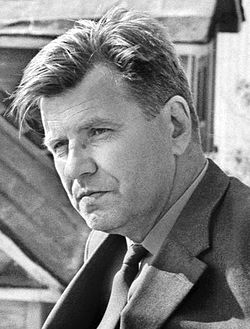Lauri Viita
Lauri Viita | |
|---|---|
 | |
| Born | 17 December 1916 Pirkkala, Finland |
| Died | 22 December 1965 (aged 49) Helsinki, Finland |
Lauri Arvi Viita (17 December 1916 – 22 December 1965) was a poet hailing from the Pispala district of Tampere, Finland.
Viita was a verbally talented son of a carpenter who became a self-taught writer. He only published four poetry collections, but they became very popular. He also inspired other writers who had a working-class background. Viita's last creative years were shadowed by a mental illness, and he spent several periods in hospital.[1]
Viita wrote mainly traditional poetry with rhymes. In 1950s, he was shadowed by emerging modernists such as Paavo Haavikko and Tuomas Anhava. He played with words and published e.g. a poem where all words started with letter K.[2]
Viita was married three times and had seven children. His second wife was famous poet Aila Meriluoto. Viita died in a car accident in December 1965,[3] when the taxi he was in was struck by a truck driven by a drunk driver.[4]
Selected works
[edit]- Betonimylläri (poems, 1947)
- Kukunor (a poetic fairytale, 1949)
- Moreeni (a novel, 1950)
- Käppyräinen (poems, 1954)
- Suutarikin, suuri viisas (poems, 1961)
- Entäs sitten, Leevi (a novel, 1965)
References
[edit]- ^ Liukkonen, Petri (2008). "Lauri (Arvi) Viita (1916-1965)". Authors' Calendar. Retrieved 24 September 2016.
- ^ Verpio, Yrjö (2002). "Luova hulluus – Lauri Viidan runous" (PDF). Tieteessä Tapahtuu (in Finnish). Retrieved 24 September 2016.
- ^ "Lauri Viita Museum - in English". Lauri Viita Museum. Retrieved 24 September 2016.
- ^ Manninen, Alpo (26 December 2020). "Vaikuttava Lauri Viita – mäntsäläläinen Jukka Lyytinen kokosi kirjailijan elämän kansien väliin". Mäntsälän Uutiset (in Finnish). Retrieved 26 May 2022.
External links
[edit]- Petri Liukkonen. "Lauri Viita". Books and Writers.
- Lauri Viita Museum
